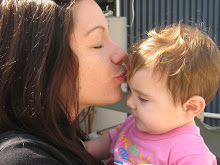"Focus on a child's ability, rather than their disability".
We hear this phrase often at University, yet many of us don't feel particularly convicted by these words. The truth remains that many of us haven't worked with children whose disabilities are so severe that their abilities are easily forgotten. Whilst this phrase is teetering on the edge of the "over used" basket, I think that it's hugely important. I'll explain by sharing a story. As you read this, please bear in mind that this was quite an awful moment for me at the time, however the lesson that I learnt is extremely valuable.
Most special needs teacher aides will agree that one of the most hectic parts of the schooling day is toilet time. Some children have very specific needs and routines when it comes to toileting. Such an everyday procedure can very quickly become a juggling act, as you try to supervise/change/wipe/wash/dry/encourage/keep quiet a handful of excited/grumpy/stubborn/loud little ones. On this particular day, there were three grade one children with special needs who I needed to take to the toilet. One child needed to have his urine drained through a catheter, another child had a severe intellectual impairment and was still in nappies, and another child needed assistance as he was born without arms. I'll refer to this little boy as J (incidentally, each of the children's names begun with J, so toilet time very quickly became "triple J time"). Anywho, as I'm sure you can imagine, "triple J time" was a very busy time indeed. Fortunately I didn't need to help the little boy with the catheter, as you need to have a special qualification to this.
On this particular day, a group of four 5 year olds with autism were using the small toilet block at the same time as us, so it was quite tricky to keep an eye on my three kids. Changing the nappy of a little boy with an intellectual impairment requires a huge amount of patience. We try to encourage the child to be as independent as possible so that he can learn to go to the toilet himself, however this takes time. Lots of time. In the chaos of that bathroom, it can feel like an eternity. Amidst the hustle and bustle and noise, I was trying to encourage this little boy to pull up his pants as he joyfully danced on the spot, evidently quite pleased with his lack of pants. Through the noise, I asked the boy with the catheter if he had washed his hands, and when he told me that he had, I asked him to sit and wait for me. Without looking up, I asked J if he had also washed his hands. Silence. After a few moments, a quiet voice replied, "I don't have any hands". I froze. I could not believe what I had just said. Even as I write this, I feel the same horrible ache in my heart. I also feel the same disappointment in my lack of tact. I stopped what I was doing to look at J and told him that I was so sorry for what I had said, but at that point I couldn't safely leave the child with the intellectual impairment, so I couldn't speak with J properly.
The following day whilst I was on playground duty, I said hello to J and called him by his name. He looked up at me, clearly surprised, and said "You remembered my name!". I replied with a smile, "Of course I remembered your name!". J then lowered his head and said "You remember me because I'm the one without any arms". I knelt down to his level, lifted his chin with my finger, looked him in they eye and said "No J. I remember you because you are the boy with the beautiful smile!". My words seemed to physically effect J, as he sat up and gave me a demonstration of his wonderful smile. From that point, I made a conscious effort to encourage J about the things that he does well, rather than focus on the things that may be lacking. This wasn't a particularly hard task for me, as there were many things that he did brilliantly. J and I very quickly became quite close, and I really enjoyed working with him.
"What's your point Carly!!". Good question. You wouldn't be the first to ask it. I'm certainly not saying that you should tell kids to find their worth in the things that they do well. But children need to feel that they are capable, and that they can positively contribute in many situations, in the same way that we need to feel like this. All children need to be encouraged, however this is particularly applicable for children with disabilities. This situation showed me very clearly how important it is to focus on J's abilities, not his disabilities. The hand washing comment was a sincere mistake, yet these kinds of mistakes can be very damaging to young hearts.
"Focus on a child's ability, rather than their disability" - This is can be very simple to do when the most significant problem you have in your class is a learning difficulty. However I'm confident that there will come a time when we will have to work extremely hard at convincing ourselves of this phrase. For some of us, we may have already experienced how difficult it can be to place a child's ability above their disability. It's hard work. But it is worth it.
Sunday, March 28, 2010
Subscribe to:
Posts (Atom)

